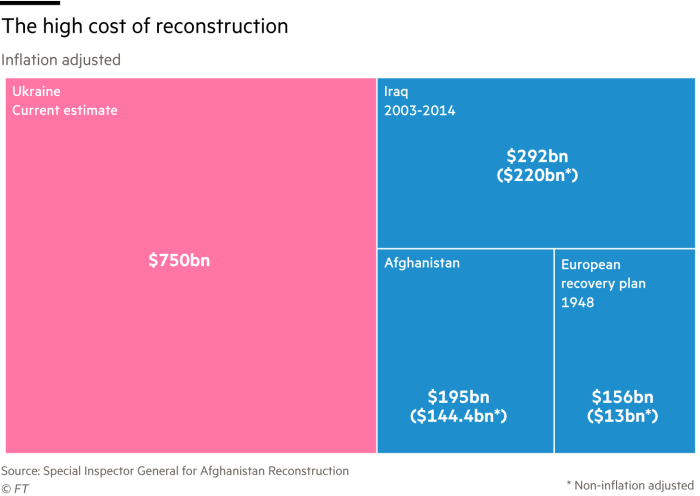Reconstruction: cost to rebuild Ukraine could exceed previous wars
Funding national recovery of war-torn Ukraine will cost $750bn, reckons the country’s prime minister, Denys Shmyhal. If history is any guide, early estimates are likely to be wide of the mark. Costs tend to escalate. Corruption can mean that funds, largely international aid, are liable to seepage.
Loss of life, the biggest tragedy in war, is irreplaceable. Homes, schools and waterworks can be rebuilt. Shmyhal is banking on $100bn for infrastructure. Mending shattered economies is more difficult. Wars cripple foreign trade, consumption and investment. They destroy wealth and economic output. Costs mount on the back of security and defence, alongside displaced citizens who need food, medicine and shelter.
Also on the bill: restoring fragile civic and financial institutions. Shmyhal envisages a final stage targeting the “long-term transformation” of the country and its economy.

America, historically the biggest donor of aid, set the tone after the second world war, writing a $13bn cheque for Europe’s recovery. Adjusted for inflation that is $156bn. The Marshall Plan worked out at about $1,000 per capita for western Europe. A similar figure was divvied out to South Korea a decade or so later.
But even adjusting for inflation, modern wars are far costlier. The war on terror resulted in a bill upwards of $220bn for nation rebuilding in Iraq; a task that included building up justice and education systems. Contracts for everything from new infrastructure to telecoms to mineral rights are frequently mispriced.

Recovery, especially for failed states, can take decades. On average, the OECD calculates, it takes 22 years for economies to revert to prewar income levels. Long-lasting hostilities in Syria, Yemen and Burundi illustrate the costs. By 2013, half of Syria’s workers were unemployed, up from 8 per cent in 2010. Half of all students had dropped out of school. Poverty rates are running at 90 per cent. Hyperinflation, above 100 per cent, is a further brake on progress.
History also suggests poor returns on this investment. Iraq and Afghanistan, replete with overpriced contracts, demonstrate the risks. So do Bosnia and Herzegovina. Decades after the war ended, a UN official visit late last year found progress halted amid governance defined by confrontation and political bargaining. These wars all had different antecedents to the conflict in Ukraine. The country must hope that its recovery will be different too.
The Lex Newsletter
Catch up with a letter from Lex’s centres around the world each Wednesday, and a review of the week’s best commentary every Friday. Sign up here
For all the latest Business News Click Here
For the latest news and updates, follow us on Google News.
